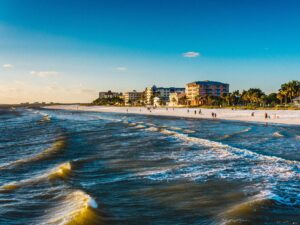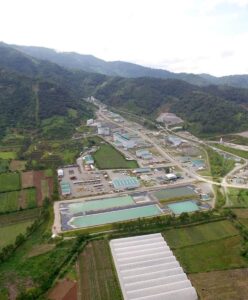The climate emergency is the defining crisis of our time. No corner of the globe is immune from the devastating consequences of climate change. Global warming is fueling environmental degradation, natural disasters, food and water insecurity, extreme weather events, rising sea levels, droughts, the spread of disease, land grabbing, displacement, and conflict. These impacts threaten the full and effective enjoyment of a range of human rights around the world, including the rights to life, safe drinking water and sanitation, food, health, housing, self-determination, culture, work, and development.
A Historical Moment: Proceedings Surrounding Climate at the ICJ, IACtHR, and ITLOS
We are living in a historical moment for climate action. A number of legal initiatives have been started around the world in response to climate change, including various requests for advisory opinions from international and regional courts and tribunals. Advisory opinions on States’ obligations in the context of the climate emergency have been requested from the International Court of Justice (ICJ), the Inter-American Court of Human Rights (IACtHR), and the International Tribunal for the Law of the Sea (ITLOS).
All three advisory opinion processes are well underway. The ITLOS released its advisory opinion on May 21, stating that greenhouse gas emissions pollute the oceans and States must take all necessary measures to prevent, reduce, and control them. The IACtHR received hundreds of amicus briefs in December, and held in-person public hearings as a part of its advisory opinion process–the first of the historic sessions occurred in April in Bridgetown, Barbados, and the last of the hearings just concluded in Brasilia and Manaus, Brazil. The ICJ has accepted written statements from States and international organizations, and is set to conduct oral hearings on June 24.
These interventions are not only significant, but are unprecedented. The world is watching, looking to these tribunals for guidance on States’ obligations to respond to the climate emergency. Additionally, these proceedings present a crucial opportunity to bolster protections for environmental defenders.
Enjoying this article?
Subscribe to the Justice Roundup newsletter to get more of the latest on human rights advocacy and litigation, delivered straight to your inbox.
Environmental Defenders: The Work They Do and the Danger They Face
In response to the climate crisis, environmental defenders are protecting our planet in a myriad of ways, including through peaceful resistance to extractive industries, traditional farming practices, journalism, lawyering, land management, and various other means. Environmental defenders make critical contributions to climate change mitigation and adaptation through this work. A global study showed that in 11% of environmental conflicts, defenders who used a single tactic “contributed to halt environmentally destructive and socially conflictive projects, defending the environment and livelihoods,” and defenders who used multiple strategies had a higher success rate of “up to 27%.” Their defense of the planet also protects human rights. As recognized by the Escazú Agreement, “human rights defenders in environmental matters [strengthen] democracy, access rights and sustainable development.”
Unfortunately, this important work puts a target on these protectors’ backs; environmental human rights defenders are the most targeted human rights defenders. They face a plethora of (largely unreported) attacks, including physical violence, criminalization, smear campaigns, subtle co-optation practices, forced evictions and displacement of environmental defenders, intimidation, judicial harassment including strategic lawsuit against public participation (SLAPP) suits to dissuade activism, and even murder.
Environmental defenders cannot continue to address climate change while facing these threats. Because environmental defenders play a crucial role in both mitigating climate change and defending human rights, States must protect them in order to fulfill their own climate and human rights obligations. However, this alone is not enough. Due to the unique set of challenges that environmental defenders face, States should be obligated to provide reinforced protection to these defenders in addition to the rights they already enjoy as human rights defenders. Further, States should take an intersectional, or “differentiated” approach to these protections to account for the additional struggles faced by defenders who are part of marginalized groups, including women, Indigenous Peoples, Afro-Descendants, and rural farming communities (campesinos). This means, as the Aarhaus Convention’s Special Rapporteur on Environmental Defenders explains, “[a]cknowledging that defenders are interconnected. Protection initiatives should not focus on the rights and security of individual defenders alone, but also include the groups, organizations, communities and family members who share their risks.”
RFKHR’s Work to Protect Environmental Defenders
The threat to environmental defenders is not only a climate justice issue, but is also a civic space one. The current unsafe environment for environmental defenders contradicts international law standards on freedom of expression and freedom of assembly. As an organization focused on protecting civic space, RFKHR is dedicated to the protection of environmental defenders.
RFKHR has conducted considerable advocacy around this issue. Notably, RFKHR has participated in the court proceedings mentioned earlier–attorneys from our International Advocacy and Litigation team submitted an amicus brief to the Inter-American Court of Human Rights and sent a written submission to the International Court of Justice, seeking to contribute to the analysis and progressive protection of environmental defenders. Senior Staff Attorney for Civic Space Sofía Jaramillo presented during the IACtHR hearings in Manaus, highlighting the relationship between environmental defenders and States’ environmental and human rights obligations. Attorneys from the US legal team filed a petition before the Inter-American Commission on Human Rights requesting a Department of Justice investigation into the 2023 murder of environmental activist Manuel Esteban Páez Terán (known as “Tortuguita”). Our organization has also co-hosted multiple events on the subject, including a webinar on environmental defenders and a virtual side event on the Inter-American advisory opinion process. We have also amplified the dangers facing environmental journalists through social media on World Press Freedom Day, and promoted individual cases regarding environmental defenders on our Civic Space Case-Tracker. One recent case highlighted by the tracker is the ongoing criminalization of Ugandans protesting the East African Crude Oil Pipeline (EACOP).
Looking Forward
While the ITLOS advisory opinion has been issued, the ICJ and IACtHR proceedings are still ongoing. The next deadline for States and organizations to submit written responses to the ICJ is on June 24, and the oral hearings are expected to take place in late 2024 or early 2025. The IACtHR just concluded its public hearings on the advisory opinion, and is expected to publish its opinion within the next year.
These proceedings present unparalleled opportunities for these Courts to further develop their jurisprudence on these matters and strengthen the protections for environmental defenders and, in turn, combat the climate emergency. Not only will these opinions clarify States’ climate and human rights obligations, but they will set precedent that will impact public policy and climate litigation for years to come.




